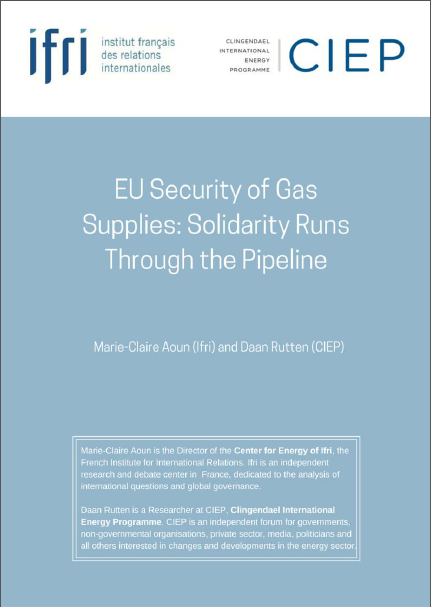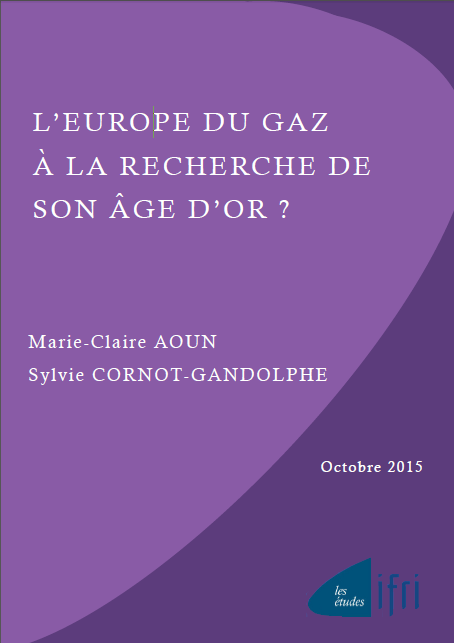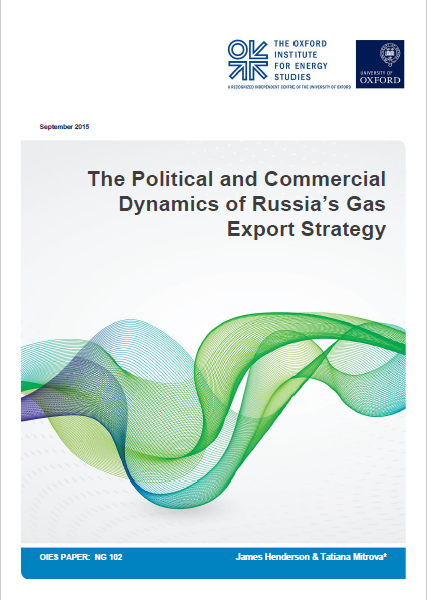Nord Stream 2: May Cooler Heads Prevail
Since the announcement of the Nord Stream 2 project in June 2015, the debate around the benefits of this project for Europe is raging, putting forward political, economic and commercial arguments.
The US Natural Gas Exports : New Rules on the European Gas Landscape
This study addresses the consequences of US Liquefied Natural Gas (LNG) exports towards Europe, in particular on the strategy of Russia, the EU’s main gas supplier.

EU Security of Gas Supplies : Solidarity Runs Through the Pipeline
Given the tensions between the EU and its main gas supplier, Russia, the European Commission has been revisiting since 2014 its energy security strategy.
Shadows on Israeli Gas Success Story: a Political and Geopolitical Risk Analysis
In Israel, both the regional geopolitical context and domestic politics play an important role in the development of the offshore gas fields.

The European Gas Market Looking for its Golden Age?
The EU gas policy has to deal with a new landscape on the supply and demand sides. This study examines five major recent evolutions of the EU gas market: the relations with Russia, LNG coming back to Europe, the decrease of Groningen production, the contrasted evolutions of shale gas and the perspectives of EU natural gas demand.

A New Era of Oil Abundance?
From 2014 to 2015, the price of oil fell.

The Political and Commercial Dynamics of Russia's Gas Export Strategy
A wide-ranging look at the way Gazprom interacts with an increasingly challenging global gas market for Russia.
Russia’s New Energy Alliances: Mythology versus Reality
This brief paper analyzes the energy relations between Russia and its “new” energy partnerships – with China and Turkey – that the Kremlin tends to publicly promote as an alternative to energy relations with the West.

East-Mediterranean Gas potential: Opportunities and Barriers
A report released by Insight_e, the European energy consortium specialised on energy policy research and analysis
Lead authors: Constantinos Taliotis (KTH) and Maïté de Boncourt (Ifri), Authoring team: Kimon Keramidas (Enerdata), Reviewer: Paul Deane (UCC)
Oil and Gas in Eastern Africa: Current Developments and Future Perspectives
The position of oil companies toward East Africa has changed considerably since 2006 when the first reserves in Uganda came to light. However, for many investors interested in the region, it remains difficult to get a clear picture of the scale of developments of this sector.
A Smiling Medveded
In Denmark last Tuesday, President Medvedev said he had a smiling face for the world. Not surprising. The deal he is reported to have done with President Yanukovitch should bring smiles to many Russian faces - mostly in the Kremlin. However, it is unlikely that the President’s namesake in Gazprom, Alexandre Medvedev is smiling because his company’s interests have once again been subordinated to Russia’s foreign policy agenda.
Energy Security, Transnational Pipelines and China's Role in Asia
In recent decades, China's transformation from a regional energy supplier to one of the world's largest net energy importers, in particular with regards to oil and gas, has led to an increasing sense of energy insecurity in Chinese policy circles. Guaranteeing adequate supplies of energy to fuel economic growth is a central element in Beijing's efforts to maintain legitimacy in the face of economic reform and transformation. To combat energy insecurity a number of initiatives are being undertaken to diversify energy inputs, suppliers, and the means of their transport.
Who Needs OPEC - Russia steps up to the Plate ?
News that Conoco will sell off a significant portion of its Russian holdings is couched in terms of various corporate strategies that make all this perfectly normal. Conoco is said to need cash and will anyway have a 10% share remaining in Lukoil that will provide them some degree of influence in corporate decisions.
Security of Supply Is Indivisible
The European gas market has an unusually large number of moving parts just now. Demand forecasts are buffeted by announcements of great expectations in de-carbonizing the energy mix, differing expectations on the longer term economic growth path and a range of assessments on how soon Europe will recover from the economic recession.
Ukraine - A Transit Country in Deadlock? Four Scenarios
Should we consider Ukraine a transit country in deadlock, and reduce its energy role just to that of a transit country? Definitely not, because Ukraine is at once a large gas consumer and producer, and possesses massive storage capacity. But the economic and political situation of the country is alarming, even without considering the possibility of another gas crisis Without such a crisis, however, the event of Ukrainian bankruptcy would attract less broad international attention simply because it would not have direct impact on European gas consumers.
Support independent French research
Ifri, a foundation recognized as being of public utility, relies largely on private donors – companies and individuals – to guarantee its sustainability and intellectual independence. Through their funding, donors help maintain the Institute's position among the world's leading think tanks. By benefiting from an internationally recognized network and expertise, donors refine their understanding of geopolitical risk and its consequences on global politics and the economy. In 2024, Ifri will support more than 70 French and foreign companies and organizations.














